So, as a guitar enthusiast, you’re asking yourself how many guitars do you really need. It’s a question I’ve asked myself repeatedly throughout my over fifty years of playing. Take it from me; with the virtually unlimited variety of guitars available, it’s easy to get caught up in the excitement of “all things guitar.”
However, owning multiple guitars comes with both pros and cons and understanding the different uses of each type of guitar can help you make an informed decision. In this article, I’ll reveal everything you should consider as you move through your musical journey.
You can use the table of contents below to take you to the area you’re interested in. Click on the little box to open it and then click on the article section you want to read, or you can read from start to finish if you want the whole experience!
You can click here if you want to go directly to the pros and cons of various guitar types.
The Short Answer
If you’re a beginning player, you only need one or two guitars (acoustic, electric, or both). Avid hobbyists and professional players tend to acquire more guitars to suit their needs. Always consider the pros and cons of each instrument before making a purchase. It’s not about how many guitars you own but how well you can play and use them to create your unique sound.
Keep On Reading (Below) To Learn More
Are You A Beginner Or A Seasoned Player?

Beginners
One of the most important things to consider is how far along you are in your guitar journey. If you’re a beginning player, I recommend you stick to playing one type of guitar before expanding your collection.
You could begin with a hand-me-down instrument or buy a new or used guitar. The guitar type is not critical, but most people have a preference between acoustic, electric, or classical. If you will be taking guitar lessons, it can be a good idea to let your instructor give you some recommendations. Ultimately, the choice is up to you!
If you’re buying your first guitar, I recommend you get something high enough quality to be playable and be able to grow with you as your skills continue to develop. You should be able to grab a decent acoustic or electric student’s guitar in the $150 to $200 price range, but you can go cheaper if your budget won’t support it.
I started playing on a Sears Jazzmaster copy electric guitar in the late 1960s and stuck with that guitar for almost three years before I purchased a replacement guitar, which was a Fender Stratocaster.
As you continue to develop your playing skills, you’ll get a better understanding of your musical preferences and guitar needs and can consider adding more guitars to your collection. Some players stick with one guitar their entire life.
My sister is still playing the Gibson acoustic guitar she bought way back in high school and has played it for over 50 years!
Seasoned Players
More experienced players and professional musicians typically own multiple guitars for various performance situations and as backup equipment. Most pros own at least one acoustic and one electric instrument to allow them to play a wide selection of musical styles as the need arises.
Seasoned players tend to know what kind of guitar they need for a particular sound and the best place to get one, which can mean borrowing or leasing it for temporary use or permanently adding one to their collection.
As you read through the rest of this article, you’ll encounter some of the key questions and considerations you should be asking yourself before you buy that next guitar.
Things To Consider Before Buying Another Guitar

Here are some of the first things you might consider before buying a second guitar. Would one or a combination of these solve your problem and save you money in the process?
- Are you too inexperienced a guitar player to make your guitar sound good?
- Have you tried a new set of guitar strings?
- Does your guitar need to be adjusted (set up) to stay in tune and play correctly?
- Would changing the guitar’s pickups solve your problem?
- Could the problem be with your amplifier?
- Would effects pedals give you the sound you are looking for?
Keep On Reading (Below) For Other Important Considerations!
How Many Musical Styles Do You Play?
The number of musical styles you play will have a major role in the type and number of guitars you will need. For example, the guitar you’ll need to play Metal will be totally different than what a classical guitarist will use.
However, there can be a lot of common ground between certain musical genres. For example, a Jazz, Rock, and Blues player could easily cover all those genres with a Gibson 335 electric guitar. One player that comes to mind is Alvin Lee. He added elements of all three styles to the band Ten Years After.
One of the best things about owning multiple guitars is that they let you experiment with different tones in a wider range of musical styles.
Guitar Choices Can Vary With Musical Genre
As I said, beginning guitar players are usually better off starting with one electric or acoustic guitar and sticking to it until they’ve learned the basics. However, if you play several genres of music, you’ll most likely end up with several guitars, eventually.
So, here’s a general idea of the tonal characteristics of certain guitar designs and why you would consider adding them to your collection. These opinions are based on over 50 years of playing experience, but there are no right or wrong answers, and there are exceptions to every rule.
Rock
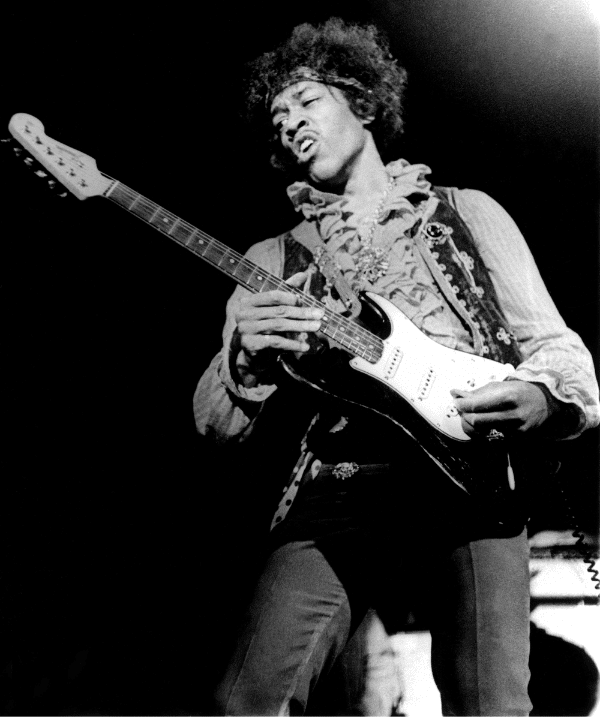
If you play Rock, you’ll probably want your first guitar to be electric, and your musical influences may be a factor in the model you select. For example, I worshiped Jimi Hendrix when I first started playing, so I just had to have s Stratocaster!
Electric guitars have the sound of rock and accommodate effects pedals well. You probably want to use an overdrive or distortion pedal, and solid body electrics are ideal because they help minimize feedback from the amplifier.
Some other guitars that are great for rock are the Fender Telecaster and the Gibson Les Paul and SG. These guitars help define the sound of Rock in the 60s.
Jimmy Page comes to mind when you think of a Les Paul guitar, although he recorded the entire first Led Zeppelin album on a Telecaster! Most people are not aware of this, but you can hear the difference in Led Zeppelin’s sound if you compare this album to everything else they did!
It’s hard to pick up a Gibson SG without playing some Tony Iommi licks. What Rock or Metal player doesn’t know the opening Iron Man riff? The other player that made a big impression on me with an SG is Frank Zappa.
Purchase Recommendation
Buy an electric guitar that has the sound your favorite rock player uses, and you can add other electrics from there. If you begin with a single-coil guitar like a Strat, you’ll probably need a dirt pedal (overdrive or distortion) to drive your amp enough to give girth to your power chords. Humbucker-equipped guitars will make your amp sustain, and your guitar sing.
Adding a Stratocaster, Telecaster, Les Paul, and SG to your collection will put you in Rock N’ Roll heaven.
Blues
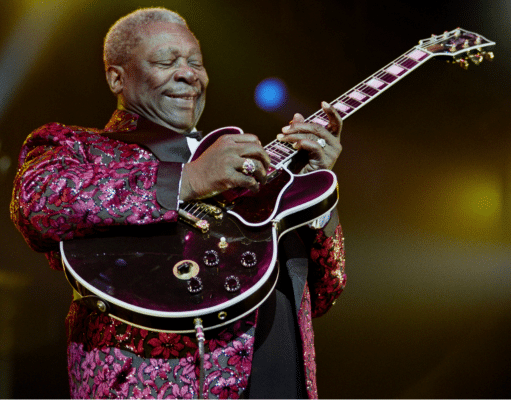
Blues players tend to use solidbody and semi-hollow body electrics like a Gibson ES-335 and acoustic guitars for the quieter stuff.
B. B. King used an ES-330 or ES-335 guitar, and then Gibson made the “Lucille” signature guitar, which was a Gibson ES-355 modified with Varitone electronics and no f-holes (to reduce feedback).
Eric Clapton and Buddy Guy like their Strats, and Albert Collins, the “Ice Man,” would have never got his sound with anything but a Telecaster!
Players like Robert Johnson and Taj Mahal use acoustic guitars exclusively.
So, it’s a real mixed bag when it comes to selecting a blues guitar.
Purchase Recommendation
Start with an all-around electric or acoustic instrument, depending on the kind of Blues you gravitate to. You probably want to have at least one electric and one acoustic.
A great combo to consider is a Strat or Tele, an ES-335, and an acoustic. If you’re going to play all acoustic blues, get yourself a nice all-around steel string acoustic with a low action that’s easy to play since you probably be bending notes.
Metal

Metal players tend to favor guitars with thin necks and a flat fretboard that allows them to shred fast passages with ease. Metal guitars commonly have pickups with active electronics for a heavier, more aggressive sound that accommodates dropped tunings well.
The so-called “Super Strat” guitars, made by companies like Kramer, Ibanez, Jackson, and ESP, are the choice of most Metal players.
Think players like Steve Vai, Joe Satriani, and John Petrucci. A notable exception is Yngwie Malmsteen, who prefers a Stratocaster with modifications like a brass nut, scalloped fretboard, and hotter Seymour Duncan pickups.
Purchase Recommendation
As a beginner, you can get a Stratocaster with a humbucking pickup in the bridge position. As you progress in your playing, think about adding a Super Strat. These guitars give you a faster neck, higher-performance humbucker pickups, and commonly use a double-locking vibrato system to stay in tune with aggressive whammy bar use.
Jazz

Depending on the artist, jazz players tend to use the widest variety of guitars. The many types of Jazz, such as Dixie Jazz, Big Band Swing, and Jazz Fusion, made any type of guitar fair game.
However, acoustics, semi-hollow body, and hollow body electrics are commonly preferred over solidbodies as instruments of choice.
For example, Django Reinhardt was all acoustic, Charlie Christian amplified his acoustic guitar, and Larry Carlton likes a Gibson ES-335.
However, Les Paul was the creator of the solidbody electric guitar and used the Les Paul guitar he became famous for inventing to play a variety of Jazz styles.
For electrics, Gibson guitars like the ES-335 and L-5 are commonly used. Fender developed the Jazzmaster guitar to capture a piece of the Jazz market, but it didn’t achieve the expected popularity.
Purchase Recommendation
If you’re unsure of the type of Jazz you want to play, I would start with a semi-hollow body electric because it can give you the best of all worlds. Inevitably, you should think about adding a hollow body electric and an acoustic to your collection to cover all the tonal options that jazz has to offer.
Country
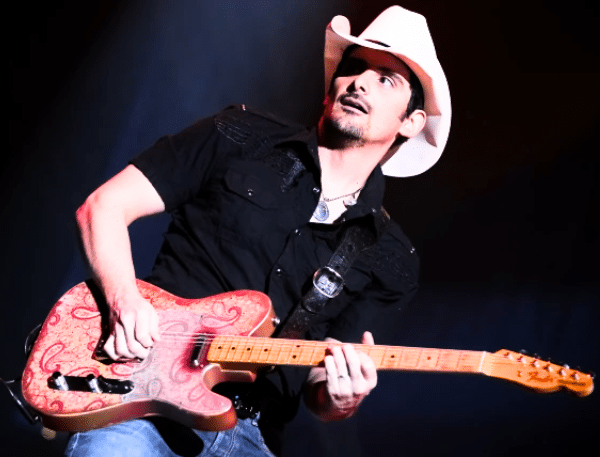
Country music guitarists use both acoustic and electric instruments, depending on their particular style. It’s common to see Country players use only acoustic guitars. Players like Buck Owens and Willie Nelson make their living singing and strumming acoustic instruments.
On the electric side of Country music, the Telecaster is king! Some of the best pickers in the world have dazzled their audiences on a Telecaster. Just have a listen to players like Brad Paisley and Vince Gill, and you’ll hear what I mean. The Telecaster has that distinctive twang that defined the early days of modern Country and continues today.
Purchase Recommendation
If you looking to follow in the footsteps of electric country guitar slingers, get yourself a Telecaster!
If you favor acoustic country, find an acoustic instrument that has the sound you seek. Be aware that they come in various sizes, including dreadnought, concert, and parlor, each with its own unique tonal characteristics.
Pop

You’ll probably find a wide variety of electric and acoustic instruments being used among guitar players in bands that play Pop (aka Popular) music. Pop music typically features the vocalist, and the band’s job is to help make that person sound great.
One glaring exception is The Beatles, otherwise known as “The Fab Four!” They were all stars in their own right!
Purchase Recommendation
Depending on the band or your repertoire, you may need to go acoustic, electric, or a combination of both. Just be aware that if you have a particular sound in your head, it’ll help you determine the equipment you need.
So, if you really like The Beatles, think about trying a Rickenbacker guitar and plug it into a Vox amp.
Folk
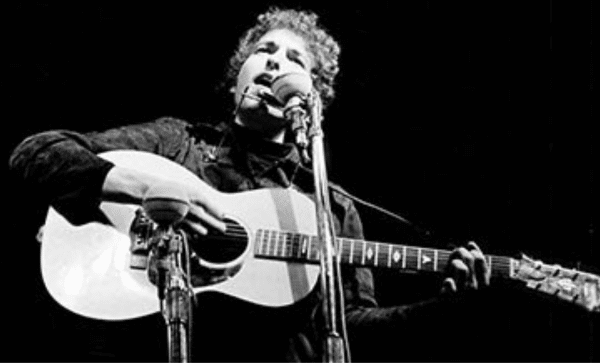
Folk music is highly dependent on acoustic guitar sounds, although I have seen guitarists use electric instruments with great results.
The name Bob Dylan or Woody Guthrie can conjure images of the very best folk guitar players!
Purchase Recommendation
If you’re heading into the Folk genre direction, your best bet is to begin with a steel string acoustic, and, most likely, you be adding other acoustic guitars to your collection.
Classical And Flamenco
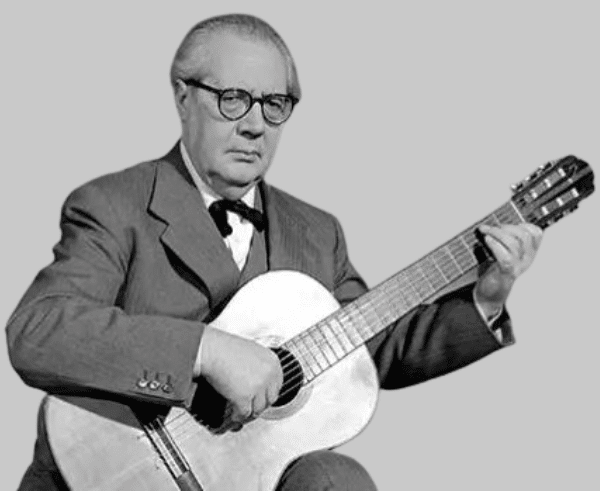
Classical and Flamenco players use nylon string acoustic guitars specifically designed to have wide string spacing for fingerpicking.
If you want to play the music of the masters, then you’re looking at these genres. People like Andres Segovia transcribed classical music to fit the range of the guitar. Flamenco players like Paco de Lucia brought the fire of Flamenco alive on six strings!
Purchase Recommendation
You’ll most likely start playing a beginner’s quality guitar and eventually advance to a more expensive model as you become a better player. It’s not unusual for Classical and Flamenco players to use a single guitar throughout their entire career, but it’s a good idea to keep a second instrument as a backup.
Pros And Cons Of Guitar Types


Here is a table that summarizes the advantages and disadvantages of various guitar designs.
| Guitar Type | Pros | Cons |
|---|---|---|
| Acoustic Steel String | Rich, warm tones Does not require an amplifier Helps build finger strength Useful for many musical genres | Can be difficult to play Less sustain compared to electric Needs amplification for big audiences Limited tonal options |
| Classical Nylon String | Warm, mellow tones Does not require amplifier Ideal for classical and flamenco Nylon strings easier to play Wider neck for fingerstyle picking | Less comfortable for smaller hands Cannot use steel strings Limited musical genres Limited tonal options Needs microphone for big audience |
| Electric | Wide range of tonal options Can be played at high volumes Excellent natural sustain Easier to play than other guitars Easily adaptable to effect pedals Good for many genres Helps build finger dexterity | Not as portable as acoustic guitars Requires a guitar amplifier May have amplifier feedback May require effect pedals Can be heavier than other guitars Takes longer to build finger strength |
Typical Guitars For Various Musical Genres

Here are some of the guitars I find sound good for different musical genres. This is by no means an exhaustive list, but I have personally played them all.
| Musical Genre | Guitar 1 | Guitar 2 | Guitar 3 |
|---|---|---|---|
| Blues | Gibson ES-335 | Fender Stratocaster | Fender Telecaster |
| Rock | Fender Stratocaster | Gibson Les Paul | Gibson SG |
| Heavy Metal | Jackson Soloist | Ibanez RG | ESP LTD M-1000 |
| Country | Fender Telecaster | Gibson J-45 | Martin D-28 |
| Jazz | Gibson ES-175 | Gibson L-5 | D’Angelico Excel |
| Acoustic Folk | Taylor Academy Series 10E | Epiphone Hummingbird | Gibson Acoustic ’50s LG-2 |
| Classical | Cordoba C5 | Taylor Academy 12e-N | Cordoba C7 |
Do You Use Alternate Or Dropped Tunings?
If you play a lot of songs in alternate tunings, like Open-G (DGDGBG), It can be a hassle to change back and forth between them and standard tuning. However, professional players have a second and even a third guitar, so they can change guitars instead of tunings between songs at a gig.
Dropped tunings can be even more problematic. For example, drop C, B, and A are Metal tunings that require dedicated guitars that require particular truss rod adjustments to keep the neck straight and intonation settings to accommodate the size of the string set. Therefore, it’s not a good idea to change the tuning on these guitars.
Onstage And Recording-Studio Playing
Each guitar player’s situation is different. Most guitar players have a variety of options, but pro players should have backup guitars to play onstage and in the studio. This gives you tonal flexibility and provides assurance for the unexpected.
Onstage performances and recording studio work can have totally different guitar requirements, although some musicians often use the same guitar for both environments.
Beginning Players And Hobbyists
Beginners and guitarists that play for fun at home or in a garage band can easily get away with having just one guitar. However, be sure to carry extra guitar strings, a guitar string winder, and a tuner with you in case you need them.
I know guitar enthusiasts with just one instrument and others that have dozens. So it really depends on your particular desire. You can be practical or go crazy buying guitars the way I do!
Playing Pro – Onstage
It’s not a good idea to have just one guitar onstage. A backup guitar can be essential in case of string breakage or technical issues during the show. It ensures the show can go on without significant interruption.
Also, some guitars may be too expensive to take to a gig. I’ve had a few pretty expensive guitars broken during transport and stolen off-stage, and it’s no fun!
I recommend you have one backup for each type of guitar, for example, two electrics and two acoustics.
Playing Pro – In The Studio
Some guitars sound great live onstage but fall short in the studio. Sometimes you need just the right studio guitar to get the perfect tone for a song. If you don’t have it, you have to make do with amp setting changes and effects pedals.
I don’t like using guitars with noisy pickups, like single-coils when I record. Sure, you can throw in a noise gait, but it can alter the guitar’s tone in an undesirable way. So I personally like recording with double-coil pickups or noiseless single-coils.
It’s not unusual for musicians that chase tone in the studio to have six or eight different guitars available in a single recording session.
When Tony Iommi was recording the first Black Sabbath album, a pickup on his Stratocaster failed. He changed to his “backup” SG guitar and played one for the remainder of his career!
How About Traveling?
If you are traveling with only one guitar, never let it out of your sight whenever possible.
It’s always best to travel with more than one guitar or make arrangements to have additional guitars available at the destination if you play professionally.
Make sure you invest in a guitar case that will adequately protect your instrument and get travel damage and theft insurance when necessary.
Do Cosmetics Make A Difference?
Cosmetics, like the shape or thickness of a guitar’s body, can change the sound and playability of a guitar. For example, a Les Paul guitar is a very different musical experience compared to a Gibson SG and a Strat.
On the other hand, things like the choice of body color are usually based on personal preference. I’ve seen people trade in guitars they really like for another instrument that is inferior in many ways but has a dazzling body color.
So, to limit the number of guitars in your collection, the moral of the story is to make choices that minimize cosmetic appeal and go for what you really need. For example, I have three Telecasters, but they each have very different pickups and tonewoods.
What Is Guitar Acquisition Syndrome (GAS)
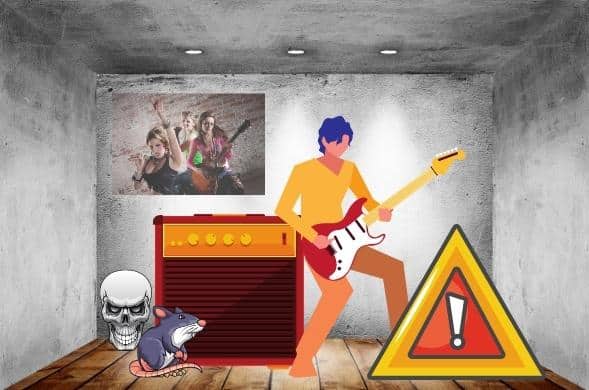
Guitar acquisition syndrome (also known as gear acquisition syndrome) is a real thing. It can happen for a variety of reasons. Some musicians think collecting guitars make them appear more knowledgeable or talented. Others believe they need to buy a signature model guitar to sound like that artist.
If we play guitar long enough, we dream of owning one guitar of every type. We’re all guilty of it to some degree. God knows I am!
In the old days, you had a limited number of choices compared to today. Maybe you wanted a Strat and a Les Paul, but the local music store only had one of each type. Now there are literally dozens of variations of every guitar model, and you can find a staggering number of ways to spend your money in big music stores like Guitar Center or online.
If there’s a guitar you never play or don’t like the sound it makes, it’s a good candidate for “thinning the herd” or trading it in for something you want more. Some guitars have such a low resale value that it’s better to hand them down to family members or friends.
How About Guitar Collectors?
Collecting guitars as a business or an investment can be different. First, collectors typically buy very limited edition or vintage instruments. Then, they store them away to allow them to further increase in value and sell them to interested players or at auction.
Can Too Many Guitars Stifle Your Progress?
Yes, I’ve seen extreme cases where players had so many guitars that they spent most of their time trying to get different sounds out of various instruments instead of primarily focusing on a practice schedule that would help them advance their playing skills.
If you’re a beginning player, I recommend you get one decent guitar and concentrate on learning new material. Playing the same guitar can eliminate unnecessary distractions and makes it easy to improve because you get used to the feel and idiosyncrasies of that instrument.
If you’re not making progress with multiple guitars, try putting some of them away and take a closer look at your learning methodology.
Do Unplayed Guitars Develop Problems?
It’s unusual for unplayed guitars that are stored properly to develop problems. However, guitars that have not been played routinely may require things like the proper humidity, cleaning, string changes, and seasonal setups.
More guitars come with more maintenance responsibilities. If you are not trained or knowledgeable in guitar adjustment and repair, keeping guitars that you seldom or never play may be more trouble than it’s worth.
Reevaluating which guitars you actually need can be a great way to give your budget a break.
Is Space A Key Consideration?

Storage space can be a significant consideration as you begin to collect more guitars. Depending on the guitars and the environment, they may require special accommodations such as protection from the sun, theft, and proper humidification.
Do you have enough space to keep your guitars on stands or wall hangers, or will you need to keep them in their cases stored away under the bed or in the closet where they are not conveniently available to play?
It’s easy to overestimate how much space you actually have available for your instruments.
What’s Your Budget Like?
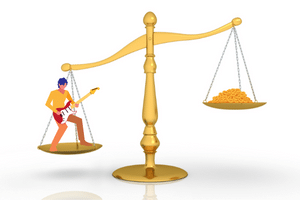
If your budget is thin, it’s a good idea to look for guitars that give you a lot of value for the money and are versatile enough to cover a variety of musical styles.
There are many brands of low-cost guitars that play and sound well. For example, the Fender Squier line of guitars are excellent quality instruments for the cost and have been used onstage by professional players.
If you’re not making money playing music, take a serious look at what you need in a guitar and if it’s worth the additional cost.
Frequently Asked Questions

Here are some of the questions I get asked about adding buying additional guitars.
If your question does not appear here, please put it in the comments, and I will get right back to you with an answer.
How Many Guitars Is Average?
The average beginning player will have one or two (usually one electric and one acoustic) guitars. However, it’s not uncommon for people who have played for a number of years and professional players to have more, perhaps an average of five to eight guitars.
Collectors can easily have dozens of instruments. Overall, the number is highly variable.
How Long Should A Guitar Last You?
If you get a guitar that is new or in good shape, it should last you a lifetime and then some! It’s not uncommon for guitars that are well cared for to be passed down through family generations.
You don’t have to spend a ton of money to get a guitar that will serve you well over the years.
Do Guitars Get Better With Age?
Yes, they do, assuming they are well cared for. As guitars age, their tonewood becomes more resonant. Some vintage guitars that are coveted for their tone can sell for a fortune.
The pickups on electric guitars can get weak-sounding as they age and lose magnetic field strength. This may be desirable in some instruments, like Jazz guitars, due to the mellow tone they acquire. However, some Rock guitars may lose a bit of their aggressive edge as the pickups age, which may not be desirable, especially if they are used to play Metal.
How Expensive Should My Guitar Be?
The answer is to spend as much money as you like or can afford. Beginning players do not need to spend a lot of money on a guitar that can serve them well.
Some of the nicer-looking, sounding, and playing guitars can definitely set you back some cash. If you have the money and love the guitar, there’s nothing wrong with grabbing it, especially if it will inspire you to play more or expand your musical repertoire.
Do Expensive Guitars Hurt Less?
I get asked this question a lot. It’s more about the guitar type and the setup than the cost.
You don’t have to buy an expensive guitar to get one that’s easy to play and doesn’t hurt your fingers as much. Beginning players will have finger discomfort until they build calluses on their fingertips. So, start slow and build up to it slowly.
Generally speaking, electric guitars with a thin gauge string set and a low action are the easiest to play. Acoustic guitars are more challenging, but it’s all what you get used to playing.
Do Cheaper Guitars Sound Bad?
Cheaper guitars can have a less desirable tone and fewer bells and whistles but still sound good. A good guitar player can make a cheap guitar sound great! It’s more about the way you play the guitar than how it’s constructed.
Final Thoughts

So, how many guitars do you really need? The number of guitars you actually need is often different than the number of guitars you want. One or two guitars should be enough for players just starting out, and you may find you never need to buy another.
If you’re like me, you’re always looking for that next guitar that sounds different than anything else in your collection. However, although owning multiple guitars can give you tonal versatility, backup capability, and recording options, you have to consider things like your budget, storage, and maintenance issues.
Understanding the best uses for the different types of electric, acoustic, and classical guitars can help you find the right instrument for your needs. Each guitar type has its pros and cons, and a particular guitar may not sound and play as expected. Playing as many guitars as possible is a good idea before settling on one particular design.
Your particular playing situation can help dictate the kind of guitars you need for things like using alternate or drop tunings, onstage versus studio recording, travel distance, and guitar cosmetics.
Avoiding guitar acquisition syndrome (GAS) can be challenging, especially after you’ve been playing for a number of years.
Storing guitars away that are not routinely played may require things like proper humidity, cleaning, string changes, and seasonal setups.
Remember, it’s not just about how many guitars you own but how well you can play and use them to create your unique sound.

Here’s a video from Wampler Pedals that I know you’ll enjoy! Check it out! It proves there’s really no hope for people who love guitars as much as I do!
Related Article ➡ Why Guitarists Change Guitars Between Songs – Ultimate Guide
What To Read Next ➡ Why Are Some Guitars Easier To Play? The Truth Revealed!
Tell Me What You Think
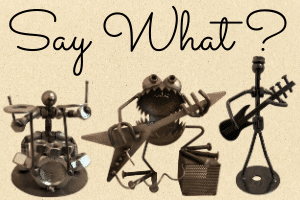
Please leave a comment below if you enjoyed this article, have any questions about guitars, or want to give your point of view. I will be happy to help you.
- How many guitars do you currently own? Do you need them all?
- What is the one guitar in your collection that’s indispensable, and why?
- After reading this article, are you considering buying or selling a guitar?
- What else is on your mind?



This is a very comprehensive post about how to choose the right guitar. I never knew there was so much to learn about guitar choices before. As a beginner, your post definitely inspires me to work more on my skills. I only have one guitar that was passed down from my father, and I love it. As you mentioned, it sounds better over the years. I wouldn’t trade it for anything else, but I’m also planning to get another new guitar. Your post clarified a lot of information for me. Thanks a lot!
Hi, Miadinh
I really appreciate your comments!
There’s nothing better than a hand-me-down guitar with sentimental value! I got a banjo from my dad, and I cherish it!
As you look for a second guitar, let me know if you have any questions, and I’ll try my best to help you out.
Rock On! 🤘
Frank 🎸
You packed a lot of information into one article. Although I have played the guitar for many years, I don’t consider myself very accomplished. I have an acoustic six string, an electric guitar and a mandolin. I take the mandolin on car trips so I can drive my kids nuts as my wife drives. I am thinking about getting a 12 string just because I like the sound and the feel of one. I play mostly folk and slow rock. As I think about purchasing another guitar, I am going to read your article a few more times.
Hi, Anastazja
Thank You for your comments!
Taking your mandolin on road trips is a fun idea! The other instrument that works well in the car is a ukelele.
People that don’t play professionally shouldn’t be concerned about their skill level. It’s the enjoyment that counts!
The 12-string is an excellent idea. It will really fatten up your sound!
Rock On! 🤘
Frank 🎸